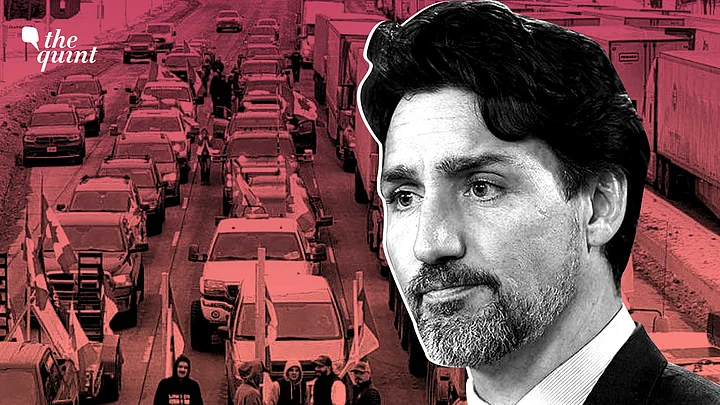It’s remarkable that democratic Canada needs to invoke emergency powers it doesn’t need, where Indian democracy produced a democratic process in which the Prime Minister was pressured into listening to his people and providing the necessary concessions the people had demanded.
Canadian Prime Minister Justin Trudeau is facing one of the worst nightmares of an elected leader – thousands of people and trucks protesting at the doorstep of the national legislature. Rather than seeking to calm the situation, Prime Minister Trudeau inflamed it, creating a more polarised and intractable situation. The protest in Ottawa and along the Canada-US Ambassador Bridge border is precisely the type of protest that Indian Prime Minister Narendra Modi faced for over a year.
Yet, Prime Minister Trudeau’s judgment on how to engage these two protests has been contradictory – encouraging dialogue in India and casually seizing unnecessary powers in Canada.
Performance Diplomacy
In December 2020, the Canadian Prime Minister pronounced on Indian farmers protests, “Canada will always stand up for the right for peaceful protests and for human rights around the world.” Only thirteen months later, when truck drivers descended upon Ottawa, the Prime Minister was moved to a secret location for his safety while he embarked on incendiary demagoguery about “fringe minorities” and “white supremacists”.
Canada’s reaction to the protests has turned the tables on Trudeau’s double standards, with his meddling in Indian farmer protests now coming home to roost. Indian media and social media, however, are having a field day. One commentator spoke of Canada’s hypocrisy, another suggested paying back in kind; even celebrities got in on it. The backlash from India has been so strong that the hashtag “KarmaStrikes” trended over a weekend. This has not gone unnoticed in Canadian media.
If Trudeau believes in the right of peaceful protests, then he should accept the protests on Parliament Hill without the drama of being moved to a secret location. By and large, the protesters have been peaceful, cleaning up after themselves, civilly disobedient, and representative of a wide section of Canadian sentiments.
Trudeau’s words and actions depict a troubling posture of performance diplomacy toward another democracy, with the potential to hurt Canada-India relations at exactly the time they need to be prioritised.
Trudeau has been sharply critical of political interference in other countries, and yet, Ottawa intervened with 'GoFundMe' to shut down its fundraising page supporting the truckers. If another country were to demand the same, Trudeau would complain about freedom being trampled. This holier-than-thou attitude smacks of elitism and is exactly the kind of high-handedness that undermines Trudeau’s credibility.
Identity-Based Politics
As immigration has increased, so has our diversity and the number of new Canadian voters arriving from other countries. Canada is proud of its large Indo-Canadian population, a politically active one, with parties actively seeking support across multiple generations. This has led to an increasingly pernicious practice among competing politicians to exploit foreign events and ensuing extremist narratives for short-term electoral gains.
Trudeau’s remarks on the farmers' protests in India were made to pander to a particular vote bank in Canada, which has rewarded him with electoral gains. But his actions set back relations with India in the midst of a global pandemic and the urgent need for democracies to establish trusted supply chains.
The Indian government conveyed its concerns in the strongest possible terms, but the damage was done.
Sadly, this is not the first time. Canadian politicians have a history of pandering to the supporters of the Air India bombing terrorists, publicly displaying the hypocrisy of preaching abroad while practising differently at home. Identity-based vote banks play a significant role in Canadian politics.
In these indulgences, politicians prioritise their own ambitions over the national interests and values of Canadians, at the expense of Canadian international relations.
A Lesson in the Importance of Consistency
The truckers’ convoy should be an object lesson in the importance of consistency. There is a danger of telling others what they ought to do when one is prepared to act precisely the opposite at home. If a democratic protest in a foreign country is acceptable, then we, as Canadians, should welcome the same. When rule-breakers challenge the laws of the land – whatever their cause – they should be confronted and stymied.
It is a tragedy that the Canadian Prime Minister has turned to draconian measures to scuttle peaceful protests, all as part of a performative need to cling to a position that provokes conflict, not promotes peace, in Canada. How refreshing it would be to see Canadian leaders whose political outreach is more informed and in line with our democratic allies, including in New Delhi, who have shown more maturity.
(Vijay Sappani is Toronto-based and a member of several Indo-Canadian organisations. This is an opinion article and the views expressed are the author's own. The Quint neither endorses nor is responsible for them.)
